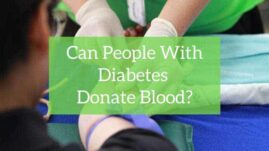One of the most common questions people ask upon a diagnosis with type 1 diabetes is, “can I just get a pancreas transplant?”.
This question is often very complicated and historically speaking, pancreas transplants haven’t been recommended as a first course of treatment for type 1 diabetes for a lot of reasons.
This article will explain exactly what a pancreas transplant is, what the repercussions are, and will highlight the stories of several people who have had this surgery done and will dig into what their lives look like today.
What is a pancreas transplant?
Like any other organ transplant surgery, a pancreas transplant is a procedure where a recipient without a working pancreas (like someone with type 1 diabetes) receives a donated pancreas from a deceased person.
The pancreas is a small organ that lies behind the lower part of the stomach. One of its core functions is insulin production, which helps to regulate blood sugars and the absorption of glucose into cells.
Most pancreas transplants are done on people with type 1 diabetes, although it isn’t recommended unless the patient is suffering from severe complications of diabetes (such as kidney disease requiring a transplant as well), due to the significant side effects to one’s health that a major organ transplant can cause.
Why is a pancreas transplant done?
A majority of patients receiving a pancreas transplant are those with is severe hypoglycemia unawareness. In fact, 93 % of patients are T1D.
In addition:
- Persons with diabetes whose blood glucose levels are not controlled with standard treatment, despite advanced patient education and self-care, may be candidates for transplantation
- Patients who also have severe renal disease should be considered for combined transplantation of the kidneys and pancreas because most persons with type 1 diabetes who undergo only renal transplantation will show evidence of renal damage within 2 years
- Lastly, some patients with type 2 diabetes are eligible, but only if their diabetes is severe, they are normal weight, lack endogenous insulin production, and have low resistance to insulin peripherally
What are the risks of the procedure?
Having a pancreas transplant is considered major surgery, and carries a risk of significant complications, including:
- Blood clots
- Bleeding
- Infection
- Urinary tract infections
- Hyperglycemia
- Failure of the donated pancreas
- Rejection of the donated pancreas
Will a pancreas transplant cure diabetes?
By definition, if you receive a pancreas transplant, you will no longer have clinical symptoms of diabetes and will no longer need to inject insulin.
There are, however, many side effects of having a major organ transplant.
With any organ transplant, it is crucial to minimize the risk of your body rejecting the donated organ. In the case of a pancreas transplant for Type 1 Diabetes, there are two driving forces that raise the risk of rejection:
- the human body’s immune system tends to attack any foreign organ, and
- a person with type 1 diabetes already has an immune system that is prone to attacking the pancreas, since that is what led to the condition in the first place.
Therefore, transplant patients are REQUIRED to take anti-rejection medication (that suppresses the immune system) for the rest of their lives, which may cause serious side effects and can be costly and difficult to manage.
Brandon Mouw, who formerly had type 1 diabetes, got a pancreas transplant two years ago after suffering from difficult-to-control diabetes and hypoglycemia unawareness for years.
He put it eloquently, saying, “Management today is taking strong immunosuppressants twice a day, having weekly blood work, managing medication side effects, and being careful of what I do and eat because of having an extremely suppressed immune system. Additionally, I have chronic mild rejection and have a close eye kept on me. I was in the hospital over Thanksgiving for a 5-day infusion to suppress my immune system further because my body was fighting the transplant.”
“I look at it like I switched diabetes management with transplant management. I am no longer an insulin-dependent diabetic. My diabetes is not cured because I go right back to being a brittle diabetic if the transplant fails. I look at it as a pause in my diabetes. I still have 31 years of diabetes in my life, and it’s only been two years since the transplant.”
What are the anti-rejection medication side effects?
After the pancreas transplant is performed, the patient will require anti-rejection medication for the rest of their life, which can have the following side effects:
- Risk of infection
- Skin cancer
- Lymphoma
- Tremor
- Headaches
- Osteoporosis
- Weight gain
- Water retention and puffiness
- Excessive hair loss or growth
- Acne
- Sensitivity to light
- High cholesterol
- High blood pressure
- Nausea, diarrhea, and vomiting
Anti-rejection medication essentially suppresses one’s immune system, making the patient more susceptible to infections and infectious diseases. All immunosuppressant drugs are available only by prescription from your doctor and come as tablets, capsules, liquids, or injections.
The goal of anti-rejection medication is to find the treatment plan that will suppress your immune system adequately to accept the new organ while having the least harmful side effects.
If you’re an organ recipient, even the slightest change from the dosing of your medication or a missed dose can trigger an organ rejection. Call your doctor right away if this happens.
Karin Hehenberger has lived with both a kidney and pancreas transplant for the past 12 years. She says that any medication side effects, for her, have been minimal and completely worth it.
“I would do it again tomorrow. Even if I hadn’t had the kidney transplant. I don’t have to worry about going low, going high, diabetes complications, computing [what I eat and how to dose] all the time. I wake up with a smile, instead of waking up and being worried. I can take on challenges that I wouldn’t have had the energy to take on before. I had a baby girl a few years ago, and I have more energy for my entire life, versus before when I had to focus on what my energy levels allowed me to incorporate. In my case that meant that work was a priority and my social life suffered.”
What happens after the transplant is complete?
After a successful pancreas transplant, the new pancreas will make the insulin your body needs, so you’ll no longer require insulin injections to treat type 1 diabetes.
You will need to keep a close watch on staying healthy, taking anti-rejection medications as prescribed, and keep a lookout for any signs of organ rejection, which include;
- Abdominal pain
- Fever
- Dehydration
- Excessive sensitivity at the transplant site
- Hyperglycemia
- Body aches
- Vomiting
If you experience any of these symptoms after transplant surgery, seek emergency medical attention, and call your doctor immediately.
It’s not unusual for pancreas recipients to experience an acute rejection within the first few weeks or months after surgery. If you do, you’ll need emergency medical treatment with intensive anti-rejection medications.
Life after a pancreas transplant
Life after a pancreas transplant varies by patient, but one thing is for sure: you will no longer have type 1 diabetes, which sounds like a dream to many patients.
However, rejection of the new organ is common: According to the Mayo Clinic, pancreas rejection rates tend to be slightly higher among pancreas-only transplant recipients than patients who receive both a new kidney and pancreas at the same time (due to kidney failure as a result of diabetes). Keep a close watch for signs of organ rejection.
If your new pancreas fails, you can resume insulin treatments and consider a second transplant. The decision to undergo a second transplant is extremely personal and complex and depends on your current health status and health and life goals.
It’s also important to maintain a healthy lifestyle with your new organ and to help protect your immune system, which will be suppressed with the anti-rejection medications. Be sure to:
- Exercise regularly (be sure to check with your transplant team before beginning any exercise regimen post-surgery)
- Maintain a healthy diet with plenty of fruits, vegetables, lean proteins, healthy fats, and fiber
- Drink plenty of water
- Take all anti-rejection medication as prescribed
- Protect your immune system and avoid people who have viral or bacterial infections or colds
- Wash your hands regularly and wear a face mask when in crowded, public spaces
- Manage stress
- Get plenty of sleep
- Seek group support from other organ transplant recipients to create a community
Karin says that one thing she wishes she had access to right after the transplant was a community of people going through the same thing.
“I had access to the best care, but didn’t have the connection with another patient. I wish I had some community. Connecting with others who have been where you are right now is invaluable. Don’t just talk to doctors, talk to other patients to better set your expectations.”
She was so motivated to help others going through the same thing that she launched her own website, www.transplantlyfe.com where people awaiting organs, those who have recently had a transplant, donors, caregivers, and family can go and seek support.
Both recipients, however, have a newfound outlook on life:
Brandon says, “The biggest change has been my gratefulness for life. Little things don’t bother me anymore. I owe so much to so many people and I give back by sharing my story, raising awareness, and making sure I do all I can to make the most out of every day.”
Karin adds, “I have one very vivid memory, when I knew everything was suddenly different: I had a cappuccino and biscotti and was walking down the street in New York City, and just thought, ‘wow, I can do that without thinking about carbohydrates or bolusing!’” Having a pancreas transplant has given me a way to live without the glucose fluctuations, feeling bad most of the time, and especially without the fear. And I’m grateful for that.”





Jude
Wouldn’t those type 2 patients mentioned in eligibility actually be considered LADA? Just curious. I’m T1D, so I don’t have a horse in the race.
Christel Oerum, MS
Great question. Not necessarily. Some people with type 2 doesn’t make enough insulin but it’d not due to an autoimmune response. LADA, like Type 1 is autoimmune conditions
Gina
Good article, but for a balanced approach, you should have also included someone who’s experience was different – such as someone whose transplant eventually failed.
Tobias Oerum
That’s a great idea. We don’t know anyone who had a failed transplant but we will ask around.
Raj
Right